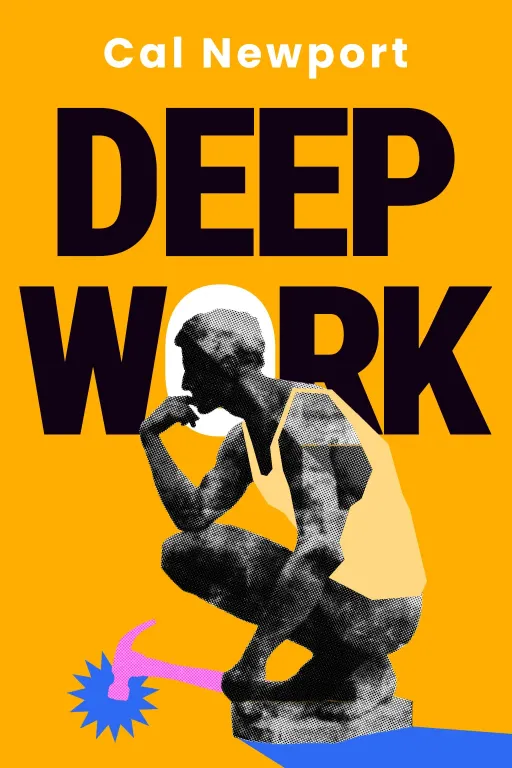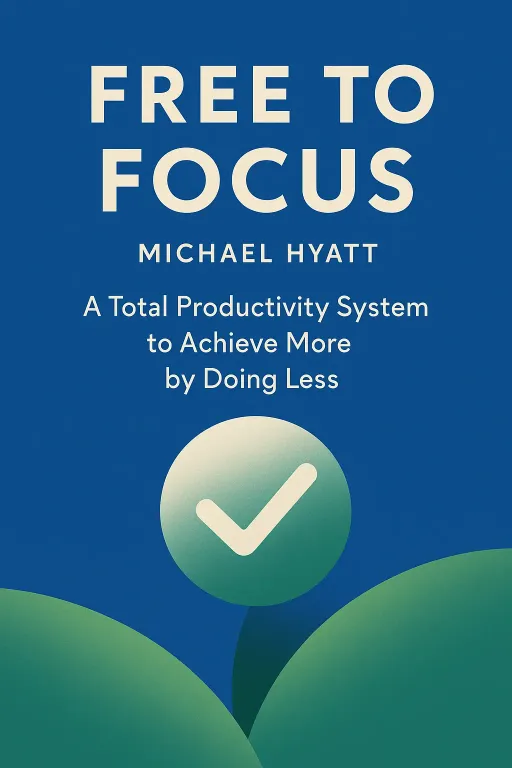
The Comfort Zone Advantage
10 minGolden Hook & Introduction
SECTION
Mark: Alright, Michelle, let's bust a myth. The biggest piece of self-help advice is "get out of your comfort zone." What if that's terrible advice? Michelle: Wait, what? That's the entire industry! Are you saying we should all just stay on the couch and watch Netflix? Mark: Maybe. Or maybe the couch is where you build the strength to run a marathon. That's the kind of paradox we're getting into today with the book Do It Today: Overcome Procrastination, Improve Productivity, and Achieve More Meaningful Things by Darius Foroux. Michelle: Darius Foroux. I know his work. He's a popular blogger and entrepreneur, right? Not a psychologist, which I find interesting. His writing is very direct, almost like a series of memos to yourself. Mark: Exactly. He's a Dutch entrepreneur with a background in business, and that really shapes the book. It’s less about abstract theory and more of a practical, no-nonsense toolkit. And while it's highly rated by readers, some critics say it feels like a collection of his best blog posts. Michelle: I can see that. But maybe that's the point? A toolkit you can dip into when you need a specific tool, rather than a dense philosophical manual. Mark: That's the perfect way to frame it. And the core problem he's trying to solve is that one word in the title: Procrastination. Why we do it, and how to stop. Michelle: Okay, so if the goal is to 'Do It Today,' why is that so hard for so many of us? It can't just be pure laziness.
The Internal War: Redefining Procrastination
SECTION
Mark: That's the first big idea Foroux tackles. He argues that procrastination is rarely about laziness. It's a symptom of a deeper, internal war. It’s a battle against fear, against perfectionism, or most commonly, against a profound lack of passion for what you're doing. Michelle: A lack of passion. That rings true. It’s the difference between binge-watching a show you love and putting off doing your taxes for three months. Mark: Precisely. He tells this great story from when he was 16, working a summer job in sales for a telecom company. His job was to make call after call. He hated it. So, to avoid the next call, he developed this elaborate system for logging the details of the previous one. He’d write down every trivial detail, taking as long as possible. Michelle: Oh, I know that move. That's the "I'm going to reorganize my entire desk before I write this one email" strategy. It feels productive, but you know, deep down, you're just hiding. Mark: It's what he calls "productive procrastination." You're busy, but you're not doing the thing that actually matters. And the root cause was simple: he had zero passion for selling phone contracts. The procrastination was a signal that he was on the wrong path. Michelle: That’s a powerful reframe. Procrastination isn't a character flaw; it's a data point. It's your brain telling you, "Hey, we don't want to be here." Mark: Exactly. But what about when you are passionate, and you still can't start? That's the other front in this internal war: perfectionism. Michelle: Right. The fear that what you create won't be good enough, so you just... don't create it at all. Mark: Foroux is brutal on this. He quotes the artist Jack Kirby, who said, "Perfectionists are their own devils." Foroux argues perfectionism is just a high-brow word for fear. Fear of failure, fear of judgment. Research he cites even links it to depression and anxiety. It’s not a noble pursuit of quality; it’s a self-destructive cycle that prevents you from ever finishing, or even starting. Michelle: So if it's an internal war against these deep-seated feelings of fear and passion-less-ness, a simple to-do list isn't going to cut it. What are the weapons Foroux suggests we use? Mark: The weapons are surprisingly simple, and they're more about mindset than about apps or planners. He talks about the power of a mantra. He mentions the boxer Floyd Mayweather, whose mantra was just "Hard work. Dedication." Repeating it over and over wasn't magic; it was a tool to shift his mental state into one of action. Michelle: It's like a trigger phrase to get your brain in the right gear. Mark: Yes, and the other key weapon is to focus on managing your attention, not your time. This is a huge theme. He quotes the Stoic philosopher Seneca: "To be everywhere is to be nowhere." We think we're bad at time management, but what we're really bad at is managing the constant pull on our attention. Michelle: That feels very modern. The endless scroll, the notifications, the twenty open tabs. Mark: And Foroux’s solution is radical. He advocates for an "Always Disconnected" approach. Turn off notifications. Block distracting websites. Only connect when you have a specific purpose. He argues that you can't moderate your way out of addiction; you have to change the system. Michelle: That sounds both liberating and terrifying. But it makes sense. If procrastination is an internal war, you have to control your environment to give yourself a fighting chance. Mark: And once you start thinking about controlling your environment and your mindset, it leads to some of his most surprising, and frankly, most controversial advice.
The Paradox of Productivity: Why Doing Less Achieves More
SECTION
Michelle: Okay, you've got my attention. What's so controversial? Mark: It's the idea that to achieve more, you should strategically do less. This flies in the face of hustle culture. It starts with that idea we opened with: the comfort zone. Foroux argues that your comfort zone isn't a prison; it's your home base. It's where your strengths, your relationships, and your skills live. You don't achieve big things by recklessly leaping out of it. You achieve them by expanding it, slowly and deliberately. Michelle: That's a much healthier way to look at it. It’s not about abandoning your strengths, but building from them. Mark: He uses his own life as the primary case study. He wanted to be a writer and speaker, but he didn't just quit his job and start a blog overnight. It was a ten-year process. He got two business degrees. He started a company with his dad. He spent years freelancing, learning what worked and what didn't. He even took a corporate job for a year and a half just to understand that world. He built a massive foundation of experience from his comfort zone before he ever tried to make a living from writing. Michelle: So the comfort zone is the launchpad, not the cage. I like that. But what about the other "do less" ideas? I'm skeptical. The world moves so fast. Disconnecting and taking more breaks sounds like a recipe for falling behind. Mark: That's the paradox. He points to research that shows how damaging interruptions are. One study he cites from the University of California, Irvine, found it takes an average of 25 minutes to get back on task after an interruption. So, that "quick check" of your email just cost you half an hour of deep focus. Michelle: Wow. When you put it like that, disconnecting isn't about being lazy, it's about protecting your most valuable asset: your focus. Mark: Exactly. And the same logic applies to breaks. He's a big fan of the Pomodoro Technique—working in focused 30-minute intervals with 5-minute breaks. The breaks aren't wasted time; they are what allow the work time to be so effective. It prevents burnout and keeps your mind sharp. It's like a weightlifter resting between sets. The rest is part of the work. Michelle: Okay, that makes sense. It’s strategic rest, not just slacking off. It seems like the whole philosophy is about working with your natural human limitations instead of fighting against them with brute force and caffeine. Mark: You've nailed it. It extends to everything. Take vacations. Don't take work home. Get enough sleep. Create an evening ritual to wind down. He even has this fascinating idea of living like you're immortal. Michelle: Hold on, immortal? Now you've lost me. Isn't the whole point that "life is short" so we have to hurry up? Mark: That's what most people think. But Foroux argues the "life is short" mindset leads to short-term, often reckless decisions. If you think you're going to live forever, you invest for the long term. You build meaningful relationships because you'll be stuck with those people. You take care of your body. You build a career brick by brick. It forces you to think about the compounding effect of your daily actions.
Synthesis & Takeaways
SECTION
Michelle: That's fascinating. So the whole philosophy is really about shifting from this frantic, brute-force approach to a more strategic, psychological one. It’s less about 'doing more' and more about 'doing the right things' without burning out. You win the internal battle first, and then you use these almost zen-like systems to work smarter. Mark: That's a perfect summary. The book's power isn't in inventing brand-new, earth-shattering ideas. Many of these concepts come from Stoicism or pragmatism. Its value is in how it packages this wisdom into a simple, actionable toolkit. It gives you permission to be human—to need rest, to have fear, to not have it all figured out. Michelle: And it focuses on what you can actually control. Your actions, your mindset, your environment. Mark: Exactly. It's about building a life, not just checking off a to-do list. And that brings me to what I think is the real takeaway. The title of the book is a command: Do It Today. It sounds urgent and demanding. Michelle: Yeah, it has that "no excuses" vibe. Mark: It does. But after reading it, I think the real question he leaves us with is much quieter and more profound. It's not, "What big thing should I do today?" It's something more like: "What is the one small, controllable action I can take right now that moves me 0.1% closer to the life I actually want to build?" Michelle: That feels a lot more manageable. And a lot more meaningful. It’s not about the hustle. It’s about the consistency. Mark: It's about the consistency. It's about laying one brick perfectly, every single day. Michelle: A powerful thought to end on. Mark: This is Aibrary, signing off.









